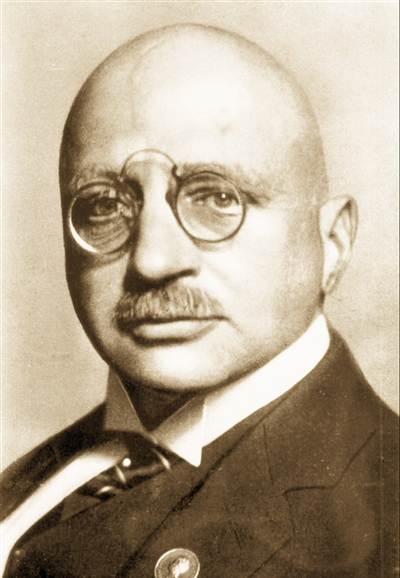
Fritz Haber (Photo/Beijing News)
Award: Synthesizing ammonia from air
In the history of Nobel Prize, some winners have have been subjected to widespread criticism, while others who have been regarded as deserving of the prize were never favored with the award.
Fritz Haber was the first scientist to synthesize ammonia from air, ending the need to rely on natural nitrogenous fertilizers. Haber was awarded the Nobel Prize for Chemistry in 1918 because of this development.
However, Haber was also notorious for the invention of toxic gases including chlorine and mustard gas. During World War I, Haber was made head of the Chemistry Section in the German Ministry of War, taking charge of the research into and production of these gases, which caused hundreds of thousands of deaths.
Although Haber did not win his award for these toxic gases, there was tremendous controversy around the question whether this scientist, who claimed that his poisonous gases would have the virtue of ending wars quicker, was a suitable recipient of the prize.
In contrast Jocelyn Bell, a Northern Irish astrophysicist, was a victim of unfair treatment. As a postgraduate student of English physicist Antony Hewish in the late 1960s, Bell discovered the first radio pulsars by analyzing statistical data from interspatial radio waves. But it was Bell’s supervisor, Hewish, who was awarded the Nobel Prize for Physics for his discovery of pulsars. His student Bell, the true discoverer of pulsars, did not even appear on the list.
The article is edited and translated from《那些年“颁错”的诺贝尔奖》, source: Beijing News, author: Chu Xinyan
 |
 Blue Angels thrill spectators in San Francisco
Blue Angels thrill spectators in San Francisco World's most intimidating nuclear weapons
World's most intimidating nuclear weapons Standard faces for each countries
Standard faces for each countries Who is China's campus beauty queen?
Who is China's campus beauty queen? Netizens fall in love with champion swimmer Ning Zetao
Netizens fall in love with champion swimmer Ning Zetao Vibrant 21-year-old and her own Cheongsam brand
Vibrant 21-year-old and her own Cheongsam brand Fashion style: Faye Wong vs Cecilia Cheung
Fashion style: Faye Wong vs Cecilia Cheung Jungle law: leopard preys on impala
Jungle law: leopard preys on impala Leading director Wang Quan'an detained for 'buying sex'
Leading director Wang Quan'an detained for 'buying sex' Top 10 handsome football players
Top 10 handsome football players  Top 10 Chinese goddesses
Top 10 Chinese goddesses  Top 20 hottest women in the world in 2014
Top 20 hottest women in the world in 2014 Top 10 fifth generation jet fighters in the world
Top 10 fifth generation jet fighters in the world Top 10 pure beauties in showbiz
Top 10 pure beauties in showbiz  Top 10 world's highest-paid models 2014
Top 10 world's highest-paid models 2014 The most gorgeous Chinese women
The most gorgeous Chinese women Top 10 most handsome faces in Asia
Top 10 most handsome faces in AsiaDay|Week|Month